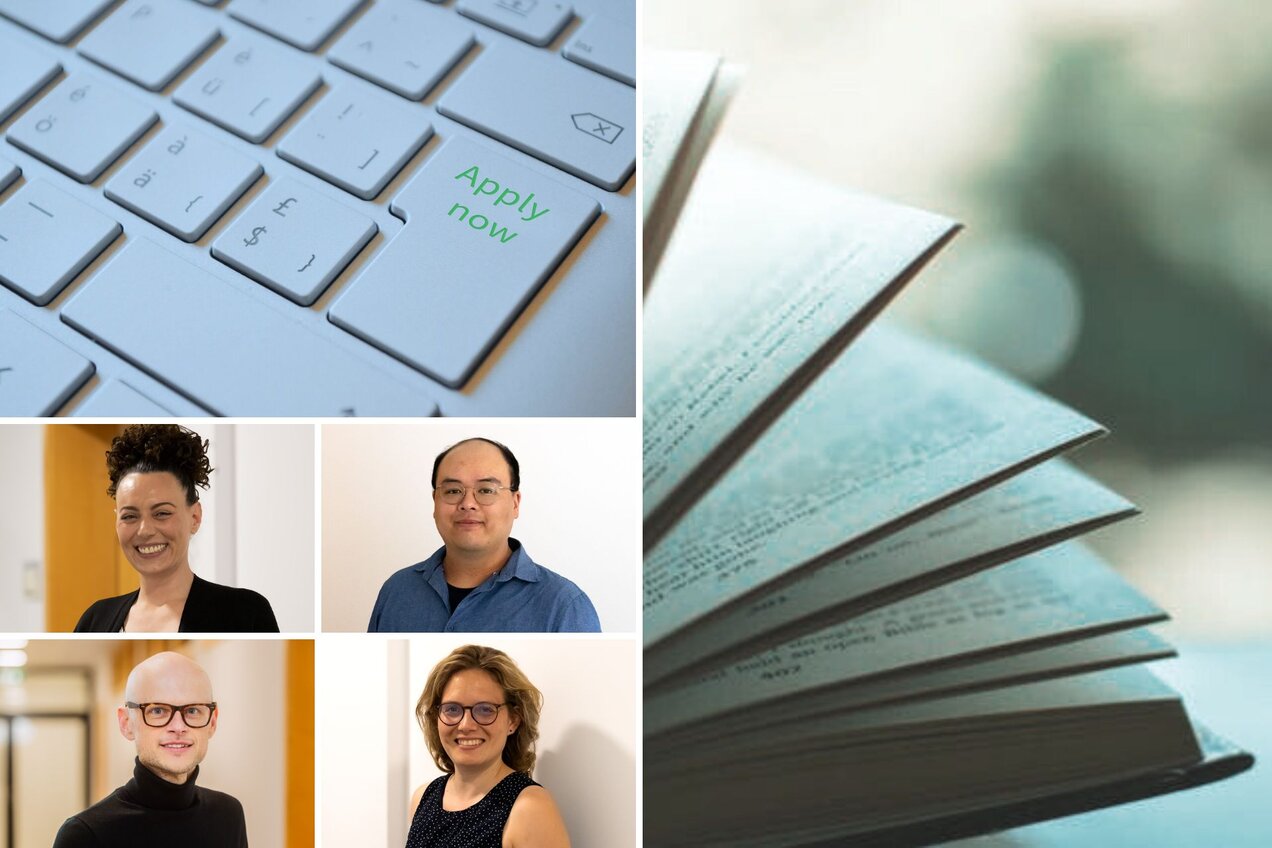
Writing for publication and securing research funding are crucial skills for academics and researchers. How can early-career academics successfully plan and navigate their publication projects and grant applications? In a two-part seminar on 18 July 2024 with a focus on the areas of education and the sociology of work, senior and junior academics, journal editors, and members of grant application panels provided insights and advice.
This feature article captures which aspects participants of the seminar found valuable and which pieces of advice they would share with fellow early-career researchers. The organisers - experienced senior researchers - explain what they consider essential for successfully writing for publication and funding applications in the social sciences.
The seminar was co-organised by Manuel Souto-Otero, Professor of Education Policy and Sociology at Cardiff University (UK) and currently a Senior Fellow at the College, his tandem partner Birgit Apitzsch (Ruhr University Bochum), and Maximiliane Wilkesmann (TU Dortmund University).

Ines Gottschalk:
My takeaway is that there are many different funding opportunities, also for the late doctoral and early postdoc phase. It was nice to visit the College for Social Sciences and Humanities and its beautiful facilities in Essen, and to learn more about the opportunity to apply for the programme PostdocLab.
I learned that the various funding institutions support different specialties. The BMBF [Federal Ministry of Education and Research] funds projects with societal, practical relevance and impact, while the DFG [German Research Foundation] mainly promotes basic research. I also found out about the European Research Council and its programmes.
What was particularly exciting about this workshop was that Manuel Souto-Otero brought a lot of international expertise to it. It was especially interesting for me that there were publishers from English-speaking countries specialising in the fields of sociology and education.

Jan Nguyen: What particularly surprised me was the fact that, with third-party funding organisations, there are differences in success rates of initial applications. This does not reduce the work that is put into such a project, but it is great to know that different levels of experience are taken into account.
Ines Gottschalk: I was surprised that the literature review should not be part of the application, but should be done beforehand. I have also learnt to pay attention to the audience of the proposal: are generalists or experts more likely to read and evaluate my proposal? Accordingly, I should write the proposal with varying degrees of specialisation.
Another new aspect for me was that I should definitely include the international perspective and the international state of research in my proposal. It is important not just to mention fancy names and colleagues, but to create a broad, compact overview.

Ines Gottschalk: I will be applying for the PostdocLab with a colleague from TU Dortmund University in order to strengthen the cooperation between the universities in the Ruhr area. I will also write publications on my specific topic before submitting a larger research proposal. In the latter, I will then bring together different interests and research strands.
Mona Bassyiouny: I found it particularly inspiring to discover how much initiative you can take when writing for publications or grant applications. It was definitely motivating to learn that reviewers' comments are not set in stone and that editors are open to constructive discussions and adjustments. This openness and flexibility gave me the courage to approach the process with more confidence and to realise my own full potential.
Jan Nguyen: As a researcher at the beginning of my academic career, I was particularly interested in gaining insights into the deliberation processes of reviewers and editors. What is prospectively important for your own considerations and how you can present your project convincingly were important aspects for me.

Mona Bassyiouny: During the writing process, it can sometimes happen that you lose focus on what you actually stand for (e.g., because you want to please the reviewers and the scientific community). After today's seminar, I have been encouraged to organise my academic profile in a self-determined way and to stand up for it. So full speed ahead, dear colleagues, and have the courage to make the case for what you believe in – even if it goes against the grain!
Ines Gottschalk: I would like to share with others that there are workshops at RUB Research School, the College for Social Sciences and Humanities and the Research Academy Ruhr, where you can find out more about funding and other topics relating to the doctoral and postdoctoral phase. The universities also often offer counselling on applications. Moreover, it seems to be worth submitting an initial grant application to the DFG, as there is a higher success rate for first grant applicants.
Manuel Souto-Otero: The event provided a chance to reflect on a wide range of skills that are vital to both getting published and getting research funding. We talked in length about skills such as critical thinking, team-work and communication skills, but also others such as management and organisation skills, networking skills, flexibility, resilience and attention to detail. An interesting feature of the sessions is that it enabled early-career researchers to see how more experienced researchers developed and used these skills in order to construct successful careers. They could also see how it is important to think beyond the next piece, and ensure that they have a coherent publications and grant capture strategy.
Birgit Apitzsch: In reflecting both the review and the application/submission processes, the speakers suggested that – in addition to originality and quality of the (proposed) research - the clarity of formulating the research question, the (planned) contribution and the arguments are key for succeeding both in grant applications and publishing. The practice of rewriting, revision, getting feedback and copyediting can contribute strongly to this.
Birgit Apitzsch: Write regularly, rework it, invite feedback from colleagues (or even from laypersons to see if you can get your points across to non-specialists).
Maximiliane Wilkesmann: Grant proposals and journal articles in the social sciences differ significantly in purpose and approach. Proposals aim to secure funding for future research, emphasising potential impact and feasibility. They require clear, compelling language accessible to non-specialists, detailed budgets, and timelines. Journal articles, on the other hand, report completed research to peers, focusing on methodological rigor and theoretical contributions. They use more technical language and follow a standard structure. Proposals are forward-looking and sometimes emphasise interdisciplinary approaches, while articles are retrospective and may be more discipline-specific. Success in both forms of writing is critical for advancing academic careers, with proposals securing resources and articles disseminating findings to the scientific community.
Birgit Apitzsch: For grant proposals, one of the main challenges can be to be specific about a planned contribution (for research, for society), and to establish why reviewers should trust you to complete the project you are applying for, by demonstrating your qualifications (e.g., in this field, methods, project management) and a plausible (ambitious but realistic) work programme.

Manuel Souto-Otero: First of all, applications need to show that the proposal clearly responds to the requirements of the specific funding call to which they are directed. In most calls excellence and originality continue to be the highest priority. In recent years we have seen an expansion of the scope for methodological innovation - much of this is related to digitalisation, but not only. There is also a push towards more interdisciplinary work. Collaboration is essential in many cases, but it is important to ensure that their rationale and added value are clearly communicated, as part of an overall compelling project narrative. In the social sciences and humanities, funders across a range of national contexts are also increasingly looking for evidence of potential for social impact. Finally, applications need to show that they offer good value for money.
Maximiliane Wilkesmann: Our workshop speakers demonstrated that navigating the complex landscape of scholarly publishing can be daunting for early-career researchers in the social sciences. However, by taking a strategic approach, you can significantly increase your chances of success. The cornerstone of a successful publication strategy is to prioritise quality over quantity. Rather than aiming for a high number of publications, you should focus on producing rigorous, innovative research for respected, peer-reviewed journals in your field. Collaboration is another key element. By working strategically with both experienced researchers and peers, you can expand your knowledge, skills, and resources. These collaborations often lead to more robust research outcomes and help you build a valuable professional network that can support your career growth.
At the very least, resilience is an important trait in academic publishing. Rejection is common, even for experienced researchers, especially from “Reviewer 2”. Rather than being discouraged, regard them as opportunities for improvement. Use the feedback constructively to refine your work and resubmit to appropriate journals.